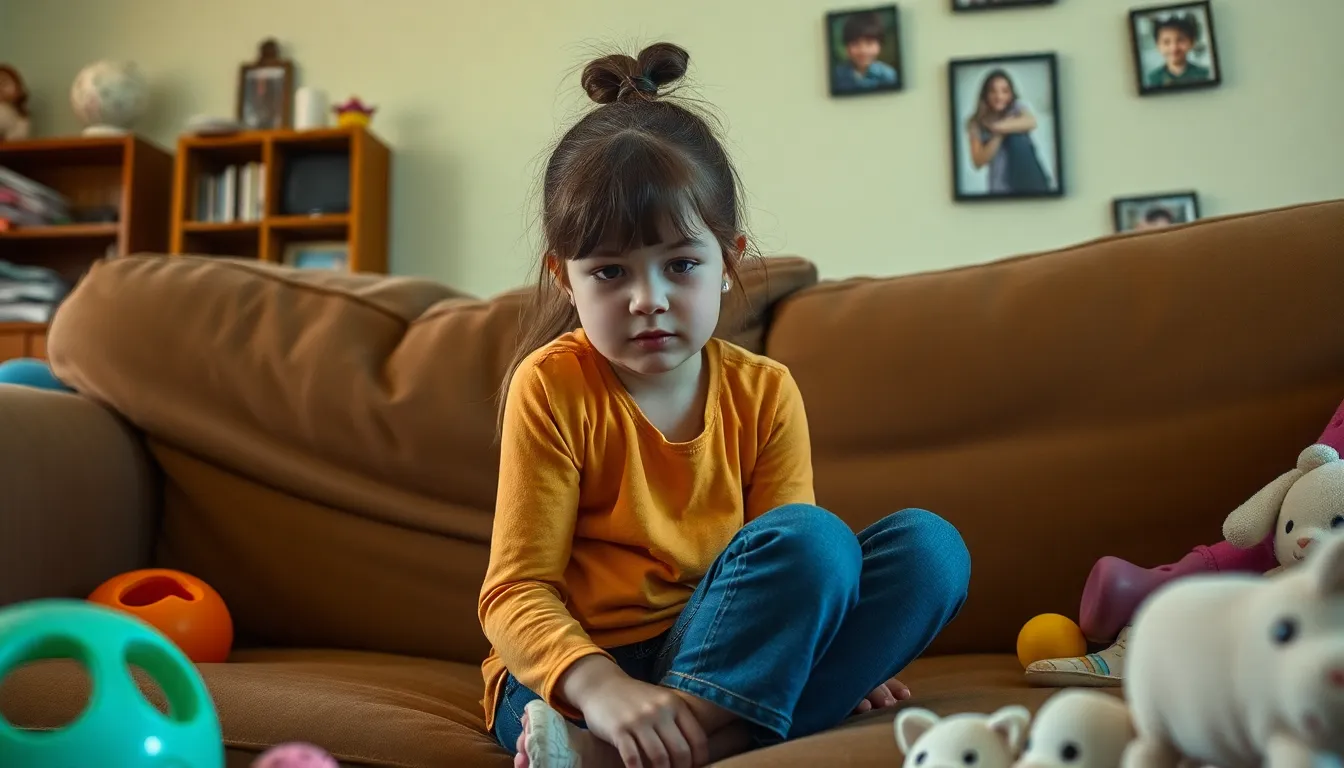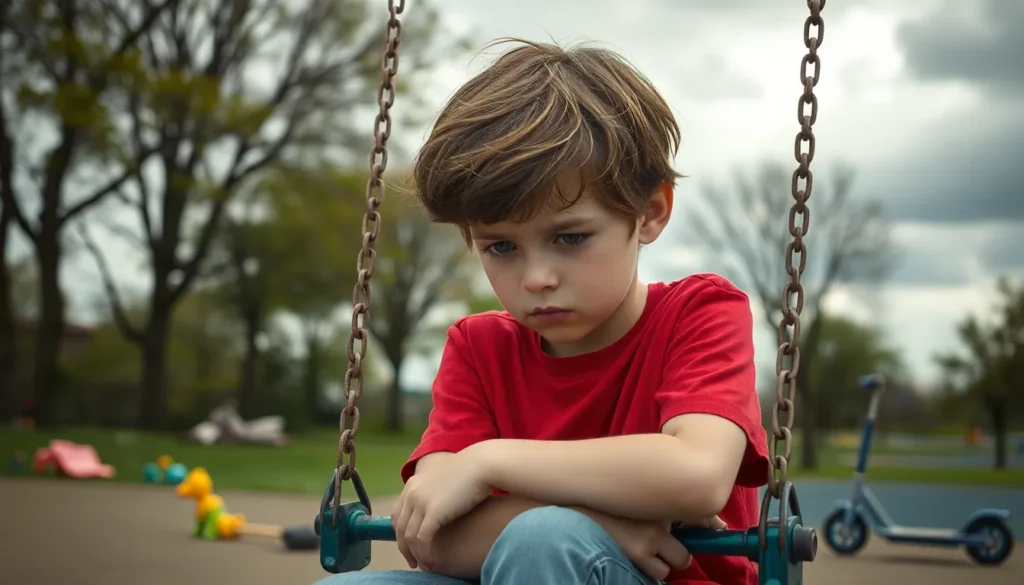Table of Contents
ToggleDivorce can feel like a tornado ripping through a family, leaving chaos in its wake. While adults grapple with their own emotional rollercoaster, kids often find themselves caught in the whirlwind, wondering if they’ll ever see their favorite toy again—let alone their parents’ sanity. It’s no laughing matter, but sometimes a little humor can lighten the load.
The impact of divorce on children is a serious topic that deserves attention. From emotional struggles to shifts in daily routines, kids face challenges that can shape their lives for years to come. Understanding these effects is crucial for parents and caregivers who want to navigate this stormy sea with their little ones. So grab your life jacket and let’s dive into the waves of divorce and its effects on children—because knowledge is the best flotation device.
Overview of Divorce Impact on Children
Divorce significantly affects children’s emotional well-being. Many experience feelings of anxiety and confusion due to the changes in their living situations. Children often worry about their relationships with both parents as they navigate a new reality.
Emotional responses vary widely among children. Some might express sadness, while others may show anger or even relief, depending on their family dynamics. Research indicates that children may struggle with feelings of loyalty, often feeling torn between parents during custody arrangements.
Academic performance can decline as divorce disrupts routines. Children might face challenges concentrating in school, leading to lower grades. Adjustments to new environments, such as moving homes or changing schools, can exacerbate these difficulties.
Social interactions also experience change after a divorce. Many children may withdraw from friends, feeling embarrassed or ashamed about their family situation. Others might seek support from peers but struggle to communicate their emotions.
While the negative impacts are critical to recognize, resilience emerges in many children. With proper support, some children adapt effectively, exhibiting strength and maturity amidst adversity. Parental involvement plays a vital role in facilitating this adjustment, as engaged parents can provide stability.
Understanding these nuances enables parents and caregivers to help children cope effectively. Conversations about feelings and creating a secure home environment foster healing. Noticing changes in behavior ensures timely intervention, guiding children through this challenging life transition.
Emotional Effects of Divorce

Divorce can deeply impact children’s emotional health, manifesting in various ways. Understanding these emotional effects helps parents support their kids effectively.
Anxiety and Depression
Children may experience heightened anxiety and depression during and after a divorce. Feelings of uncertainty about living arrangements and parental relationships often contribute to this emotional distress. Reports indicate that around 25% of children from divorced families face significant mental health challenges, such as anxiety disorders or depression. Many kids express worry over losing one parent or the family structure they knew. These emotions can hinder their daily functions and overall outlook on life. Noticing signs like excessive fear or sadness allows parents to seek help promptly.
Behavioral Changes
Behavioral changes frequently accompany emotional turmoil in children facing divorce. Some kids may display increased aggression or defiance as they struggle to process their feelings. Others may become withdrawn, isolating themselves from peers and activities. Approximately 30% of children exhibit noticeable behavioral issues during this transition. Disruptions to routines can lead to increased tantrums and conflicts at home, impacting their relationships with others. Recognizing these changes serves as a critical step for parents in providing necessary support and intervention. Engaging in open communication about their feelings can foster emotional resilience, guiding kids through these challenges.
Social Implications
Divorce can lead to notable changes in children’s social dynamics. It often disrupts their relationships with peers and alters family interactions.
Relationships with Peers
Children frequently experience shifts in friendships following divorce. Some may withdraw, feeling isolated or unsure about how to connect with others. This withdrawal occurs as kids process their emotions, making social interactions challenging. Additionally, some may find it difficult to communicate feelings, leading to misunderstandings with friends. Others might face teasing or stigma due to their family situation, further complicating peer relationships. Approximately 40% of children report feeling alienated from their friends during or after their parents’ divorce, highlighting the importance of supporting social engagement.
Family Dynamics
Family dynamics undergo significant change post-divorce. The absence of a parent’s involvement can lead to emotional distance between children and one or both parents. Children often struggle with divided loyalties, wanting to spend time with both parents while feeling torn. Adjustments like new living arrangements and blended families can cause confusion and anxiety. Many children report that their relationships with siblings can either strengthen or weaken during this time. Research shows that about 60% of children experience shifts in their family roles, which can impact their development further. Engaged parenting plays a crucial role in maintaining stability and encouraging healthy family connections.
Academic Consequences
Divorce impacts children’s academic performance and engagement. Adjustments during this period may disrupt their focus in school and extracurricular activities.
Performance in School
Children experiencing divorce often see a decline in academic performance. Research shows that around 20% of kids face challenges in maintaining their grades post-divorce. Adjusting to new routines can be difficult. Feeling anxious or distracted, many struggle to concentrate, leading to lower test scores. Teachers might notice changes in behavior, with some students becoming withdrawn or unmotivated. Regular communication between parents and educators can help track progress. Support at home plays a vital role in ensuring children maintain their educational standards.
Engagement in Extracurricular Activities
Divorce effects extend into children’s involvement in extracurricular activities. Many kids withdraw from teams or clubs, feeling overwhelmed by emotional upheaval. Approximately 30% of students participate less in these areas following their parents’ separation. Losing interest can lead to missed opportunities for social interaction and skill development. Parents’ encouragement can help children re-engage with previously enjoyed activities. Structured routines provide a sense of normalcy, promoting involvement even through challenging times. Active participation fosters resilience, and connections with peers can alleviate feelings of isolation.
Long-Term Outcomes
Divorce can lead to significant long-term impacts on children, shaping their futures in various ways.
Adult Relationships
Children of divorce often face challenges in their adult relationships. Trust issues may arise, causing difficulties in forming healthy partnerships. Independence becomes a focus for many, with some fearing intimacy or commitment. Research shows approximately 50% of individuals from divorced families report struggles in romantic relationships. The uncertainty experienced during childhood may hinder their ability to communicate openly with partners. Emotional connections often feel complicated, with lingering attachment insecurities affecting their interactions. Early experiences can shape their expectations of love and partnership as adults.
Mental Health Considerations
The mental health ramifications of childhood divorce extend well into adulthood. Studies indicate around 25% of children exhibit persistent mental health issues stemming from their experiences. Anxiety and depression often recur, influencing their coping mechanisms as they transition into adult life. Adults from divorced families frequently report increased rates of mood disorders compared to peers from intact families. Moreover, social withdrawal may emerge as a coping strategy, complicating their ability to form close relationships. Timely intervention and supportive environments during childhood play critical roles in mitigating these long-term mental health effects.
Divorce can leave lasting marks on children’s emotional and social development. While many may face immediate challenges like anxiety and behavioral changes, the right support can foster resilience. Engaged parenting and open communication play vital roles in helping children navigate this tumultuous time.
Understanding the complexities of their feelings and experiences allows parents to create a nurturing environment. As they adapt to new realities, children can emerge stronger and more equipped to handle future relationships. Prioritizing their well-being not only aids in healing but also lays the foundation for healthier adult connections.





